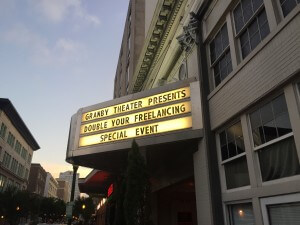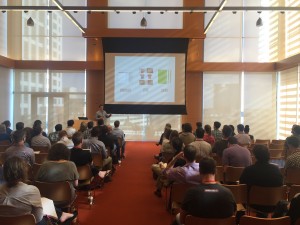I learned a lot when I hosted my first-ever conference.
Unlike a lot of the work I do nowadays (like creating educational content, getting clients, being interviewed on podcasts, and so on), this was something that definitely took me out of my comfort zone. While I hosted a number of events for my agency, mostly with the intent of generating sales leads, I never hosted a huge conference.

But I did it. And based on the 60 or so surveys I received back, attendees gave it an average 4.8/5 star rating — yay!
In this article, I’m not going to comb over every talk and summarize what was covered. Plenty of other reviews and summaries, which I’ve listed at the bottom, have already done that. Rather, I’m going to share both what I’ve learned and confirmed after spending a few days surrounded by 120 of some of the most business-minded freelancers, consultants, and agency owners around.
@brennandunn put on a first rate freelancing conference! My head is spinning with ideas and action items. #dyfconf
— Schell Gower (@SchellG) September 18, 2015
Over the years, I’ve been to a number of conferences. Most of them were technical and were attended by a mix of employees, employers, and freelancers. If anything related to freelancing or consulting, it was during a periphery talk rather than a keynote.
When planning the Double Your Freelancing Conference, I wanted it to be technology agnostic. Whether you’re a Ruby developer, a designer of logos, a freelance blogger, or whatever else, you’d get something out of each talk. And since the focus was entirely on the business behind our crafts, I opened by letting people know that it was safe to unplug from their clients and their projects.
So we kicked off a two-day spa retreat for businesses. And here’s what I learned…
1. We’re all in this together
I had a friend who I invited to the Thursday night after party (which was amazing — we chartered a large boat and went on a 3-hour sunset cruise into the Chesapeake Bay). He knows nothing about freelancing or technology, but he knows a bit about business.
“For a business conference, everyone I met was super friendly and was legitimately trying to help each other.”
 You know how it often takes someone else to notice something that’s been right in front of your nose all along? Well, that’s exactly what that comment, especially the latter bit, did to me. He was right. A lot of us were competitors of each other, but we were opening up and sharing what’s worked and what hasn’t.
You know how it often takes someone else to notice something that’s been right in front of your nose all along? Well, that’s exactly what that comment, especially the latter bit, did to me. He was right. A lot of us were competitors of each other, but we were opening up and sharing what’s worked and what hasn’t.
I’ve never gone to many suit-and-tie business conferences in the past, but I’ve been to my fair share of local business networking groups.
Most chats I’ve had at these events have always rung a bit selfish. Each person was trying to figure out what they could get from or sell to the other, which was closed (as quickly as possible) by a ritualistic exchange of business cards.
But the conversations at the conference were largely genuine.
People wanted to learn from each other and, most importantly, help each other.
2. We’re not afraid to invest
The people I met weren’t afraid to invest time and money in their businesses.
One of the biggest challenges for my own business was getting comfortable with the fact that revenue isn’t the same as profit, and that your availability (time where you’re working) shouldn’t be spent entirely on your client projects.
Everyone who was at the conference was giving up at least three days of billable time. They spent money on the conference, the flights, and the hotel. They forfeited short-term revenue for long-term success.
I have to tell you: this was one of the hardest things for me to appreciate and adopt in my own business.
Whether paying for a course or book to learn something new, hiring people to help me grow my business, either in an advisory role (coaching) or immersive (virtual assistants, audio engineers, etc.), or spending money on ads or paid networking opportunities, I used to reluctantly earmark money from client revenue with the intent of growing and sustaining my business.
The attendees at the conference cared more about where they’ll be in a year or two than what particular projects or clients they might happen to have on deck at the moment.
3. We acknowledge our faults
If you hang around enough online forums for freelancers, you’ll inevitably run across posts like: “My clients all suck! They’re such cheapskates.”
In fact, there are a number of websites dedicated to mocking clients for silly requests or ridiculous expectations. While there’s some truth in all of that, rarely do freelancers who have had a bad client or two sit back and think, “How have I contributed to this problem?”
 I truly think the hallmark of a mature freelancer is someone who owns up to his or her limitations.
I truly think the hallmark of a mature freelancer is someone who owns up to his or her limitations.
They don’t think, “I hate my client for raising a fit over the fact that I billed for meetings” (this was me a few years ago). Instead, they question, “How could I have set expectations differently
so this client would willingly and happily pay for meetings?”
Everyone I talked with was chiefly interested in growing both personally and professionally. We want to be better and offer a premium service to our clients, and the natural end that we’ll achieve is more money, high client values, and so on.
I was really impressed by how much ownership each attendee took to his or her success. Rather than thinking that so-and-so is just inherently more lucky or well connected, they instead tried to reverse engineer the other’s success. What are they doing right? Wrong? What can I learn from them? How can I help them learn from my own experiences?
More reviews:
The recordings from this conference are now available.
Here are some other reviews:
- FT 028: #DYFConf 2015 and the Mindsets of Successful Consultants by Matt Inglot
- Marcus Neto’s review
- #DYFConf2015 Retrospective: My Personal Journey From Introvert to Public Speaker
- Double Your Freelancing as an Authority by Lori De Milto
- What I Learned At DYFConf by Glenn Stovall
- My OH SHIT Moment; Pushing Through The Uncomfortable and Conquering My DYFConf Talk by Julie Elster
- My takeaways from DYFConf by Shelley Tran
- Three “E’s” I Took Away From The Double Your Freelancing Conference by Cody Landefeld
- Now I’ve Really Got No Excuse by Michael Bower
- DYFConf Action Plan PDF by Ryan Castillo
- 5 Tangible Takeaways from the Inaugural Double Your Freelancing Conference by Gina Horkey